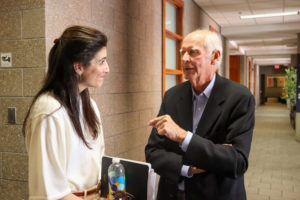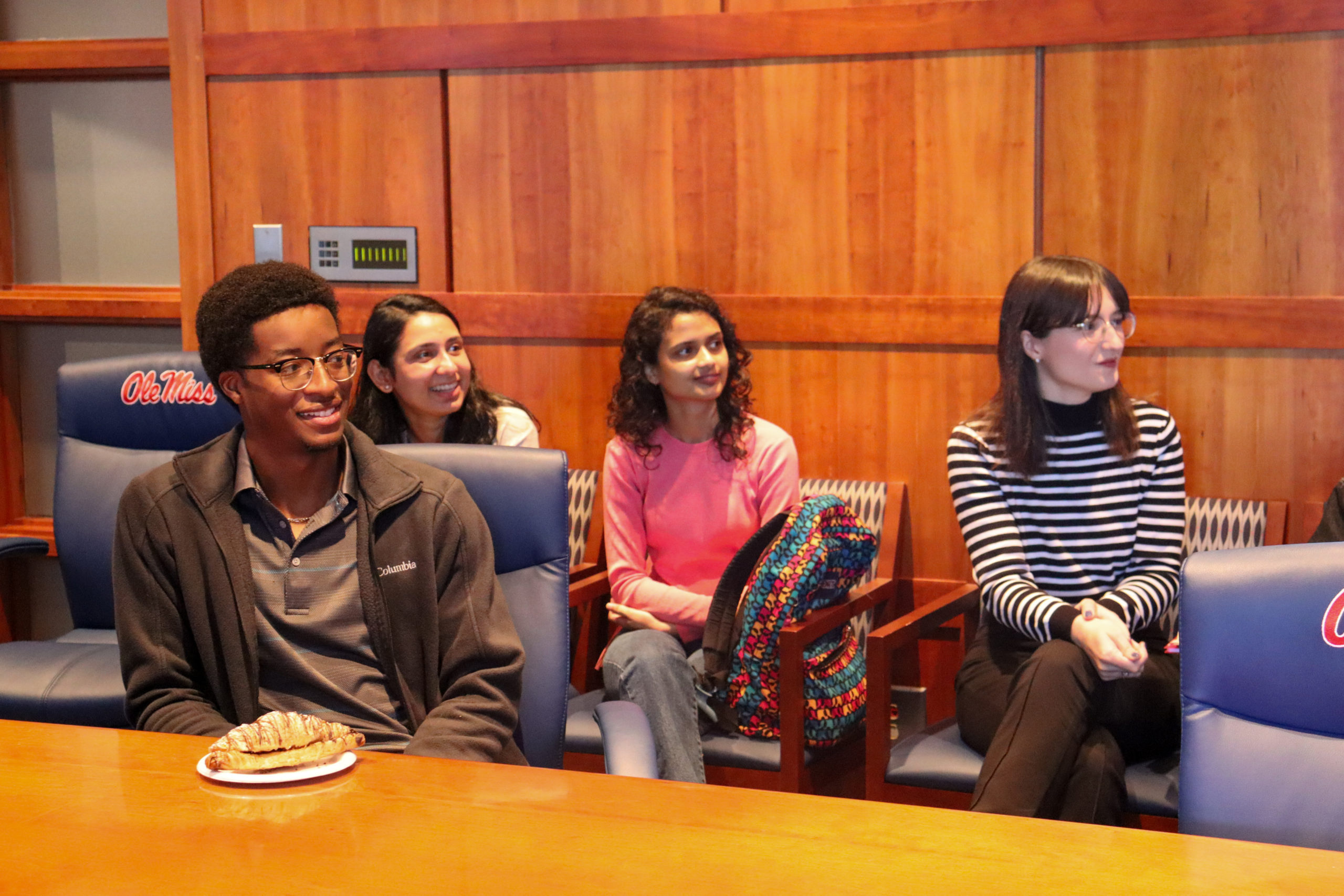A former dean and three professors of the University of Mississippi School of Business Administration returned to campus to share advice with graduate students planning academic careers.
“Students have said, ‘You made a profound difference in my life,’” recalled Randy Boxx of Siloam Spring, Arkansas, dean emeritus of the Ole Miss business school and of the Harry F. Byrd, Jr. School of Business at Shenandoah University. “When you hear statements like that, then it’s all worth it.
“You can talk about the teaching you do in the classroom, the research you conduct and the service you do as young assistant professors to build your careers and seek tenure. But in the final analysis, what impact do you have on young people? To me that’s what it’s all about,” said Boxx, who also was dean of the Else School of Management at Millsaps College in Jackson, Mississippi.
Ron Bush of Fairhope, Alabama, a former Distinguished University Professor at the University of West Florida and former faculty member at Louisiana State University, advised the graduate students to measure work satisfaction against the opportunity of teaching.
“We have one of the best professions in the world. You get to influence young students who are eager to learn, and you get to do research on topics that interest you,” said Bush, who served as an assistant professor of marketing at Ole Miss in 1973-1978. “Name another profession where you can go in and say, ‘I believe I’ll work on this.’ It’s been wonderful to be a college professor.”
The professors recommended the graduate students thoroughly investigate where they consider working.
“Ask questions about the environment,” said Joe Hair, Jr., of Mobile, Alabama, the Cleverdon Chair of Business and the director of the Ph.D. in Business Administration Program at the University of South Alabama’s Mitchell College of Business and formerly an Ole Miss assistant professor of marketing in 1971. “Who are you going to be working with in terms of colleagues and who will be supervising you? Find out what resources are available to you.”

Paul Busch of College Station, Texas, the retired Texas A&M University System Regents Professor of Marketing, Presidential Professor for Teaching Excellence, professor of marketing at A&M’s Mays Business School and Ole Miss assistant professor of marketing from 1973-1977, echoed Hair’s comments.
“People join organizations but leave supervisors. Some argue that your supervisor is more important to your long-term health than your doctor. It’s hard to know going in, so ask a lot of questions on the environment,” said Busch, who applied the philosophy and tools of positive psychology, with an emphasis on Gallup’s Clifton’s StrengthsFinder, in his teaching and research.
Hair, who has written 16 textbooks of which six are market leaders, encouraged the students to develop passions and interests in academic study. “Keep learning and digging.”
Bush also spoke on choosing research topics. “Pick something with meaning; try to choose a topic important to society. There’s a debate about the relevance of academic research to practitioners, so choose your topics carefully and consider timeliness.”
“Research is important, but teaching is also important,” said Boxx, who came to Ole Miss in 1971 and served 28 years and now provides Association to Advance Collegiate Schools of Business (AACSB) consulting services for initial accreditation and continuous improvement review, as well as strategic planning and risk management. “Think about what it takes to be an effective teacher. Keep your finger on the pulse of your students and create a student-centered learning environment.
“Have your students read the material outside of class and come to class to do applications — real applications. Assign projects with real companies and encourage internships.”
Ken Cyree, dean of the School of Business Administration, expressed gratitude to the educators.
“We greatly appreciated these professors sharing their wisdom with our students and inspiring our current faculty,” he said. “They provided crucial leadership to our business school and particularly to our Department of Marketing during their time of service here. Afterward, they continued to distinguish themselves in their contributions to higher education.”
Other advice offered by the four higher education leaders included:
- Try to connect yourself to business and industry. Many times, leading executives and entrepreneurs can position you for a research project or offer your students internships.
- Branch out of your business school. Some of the most exciting work is taking place at the intersection of business and other disciplines.
- Collaborate inside and outside of your university.
- Build relationships through service. Get your name out across campus through service on committees.
- Nurture connections with the university’s alumni.
- Be prepared to re-invent yourself and make mid-career transitions.
- Because of the time commitment required, postpone writing a textbook until you’re a full professor.
- Beware of the colleague who comes to your office door to complain about leadership.
- Plan your retirement.
- Pursue interests outside of the academic world.
Boxx said two long-term strategic directions he espoused for business schools are enhancing academic excellence and improving recognition and reputation — directions the aspiring professors could implement.
“To build a high-quality business school, it will always start and will always end with faculty. It is not the technology; it is not the curriculum and it is not the physical facility. The very best faculty possible must be hired and retained,” Boxx said.
To learn about supporting the Ole Miss School of Business Administration, contact Angela Brown, senior director of development, at browna@olemiss.edu or 662-915-3181.
By Tina H. Hahn/UM Development


